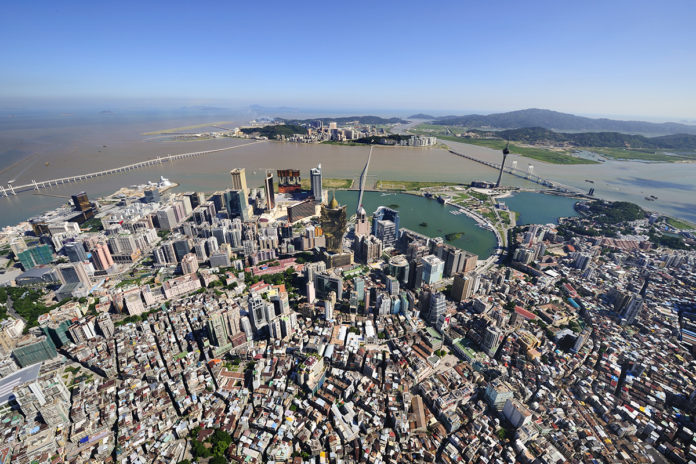Times are hard for small and medium-sized enterprises, says the chairman of Macau’s SME Association, Stanley Au. The government could do more and the business sector should help itself The dragon is an auspicious, powerful symbol in Chinese culture and while the Year of the Dragon was welcomed not long ago, Macau’s small and medium-sized enterprises (SMEs) are far from optimistic about business in 2012. SMEs are likely to face a difficult time, says Stanley Au Chong Kit, chairman of the Small and Medium Enterprises Association of Macau and boss of Delta Asia Financial Group, which owns Banco Delta Asia. Apart from a trying global outlook, there are difficulties at home for SMEs; mainly rising rents, rising rates of pay and the shortage of labour. He says shop and office rents have surged by 50 percent to 100 percent over the past three years, suffocating SMEs and outraging several business owners. Many shop owners have even chosen to stop doing business and let their shops because it is more profitable. “I have also seen a lot of SMEs that were forced to close down because of the high rents,” Mr Au says. Other reasons for the closure of SMEs include the legal obligation to pay employees triple time for working on statutory holidays, difficulty in hiring Macau residents and the rising cost of importing workers. Mr Au predicts that some SMEs may do better this year. Businesses selling high-end goods and services should benefit from the rising number of mainland tourists and from a steady stream of foreign gamblers. However, most of these are owned by businessmen from Hong Kong or overseas, as few local SMEs are involved in the luxury goods sector, he says. Late leavers Mr Au says there is an imbalance between demand and supply in the labour market. “There are people who can’t find a job whilst there are jobs that no one wants to do.” He blames “overly lenient” examinations and assessment at schools. “Because of the 15-year free education, local youths basically find it very easy to get into university, with no need to pay tuition fees. But I think it’s a mistake,” he says. “Young people who aren’t keen to study will continue to do so in order to get a university qualification. With a university certificate, they will not prefer blue-collar jobs. Meanwhile, those with low educational qualifications will go to become casino dealers because of the relatively high salaries.” Mr Au suggests the establishment of vocational institutes to teach building and renovation, electrical and electronic engineering, fashion design and carpentry to students interested in learning a trade. “This way society can be developed in a more balanced manner and it will be easier for SMEs to hire the people they need.” He strongly opposes the government’s cash handouts, which began in 2008. He says the money could have been used to help SMEs increase their knowledge and to diversify the economy. This year the government will give MOP7,000 (US$875) to each permanent resident and MOP4,200 to each temporary resident. That is the same amount offered last year and will cost the government more than MOP4 billion. Diversification dead-end The biggest challenge for SMEs, Mr Au says, is lack of knowledge. This makes it hard for them to progress and adapt to changes in the business environment. Although Beijing and the Macau government have continued to tout the importance of economic diversification, Mr Au says it cannot be achieved because of the lack of official support and the low level of professionalism in SMEs. “Macau’s development in diversifying the economy has remained stagnant,” he says. The businessman suggests the most effective way to diversify the economy is to buy patents for technologies developed by universities elsewhere, including the mainland, and put them to commercial use, setting up production lines and marketing and head offices in Macau. Mr Au says a lot of SMEs have “very strong financial capability”, so it is not lack of finance that hampers them, but the shortcomings of the owners. “They don’t have the vision, the knowledge and the determination,” he says. “They tend to be conservative and don’t like to take risks, and would rather keep their money safe to ensure a stable retirement life.” Looking on the bright side, chief executive Fernando Chui Sai On announced last year that the government would accelerate the processing of applications by SMEs to import labour. Mr Au says he has seen some improvement in this respect. “The Macau government has shown more understanding and sympathy by shortening the approval process and making it easier for us to get higher numbers of workers. If we apply for 10 imported workers, in the past we could only get two. But nowadays we can get four to five,” he says. “But, of course, the increase is still not enough.” Mr Au admits however that labour importation is many times not only dependent on the Macau government. He points out that requests to import workers from the mainland are also subject to approval from authorities there. Fantasy island Mr Au says support from the government means more than just speedier imports of labour. He says the Macau government’s record in supporting SMEs is worse than the mainland government’s. The authorities here “spend too much energy on the gaming, tourism and convention industries and have neglected the SMEs”. He questions the ability of some officials to come up with helpful initiatives. Mr Au’s association, in partnership with the University of Macau, is due to publish a white paper on the SME sector at the end of September. It will be sent to the government to help it make policy. Preliminary findings were disclosed last month, showing that 24 percent of SMEs are not optimistic about the local business environment and want more government subsidies and tax reductions. “We hope the government can set up an SME bureau which will be run by people who have the professional knowledge of our sector and the economy – not just by ordinary civil servants,” he says. Mr Au suggests that the government give SMEs financial support to get into innovative and creative businesses. “Macau needs to have an investment board, like in Singapore, for people who have a business idea, but don’t have enough funds, to work in partnership with the government.” The development of neighbouring Hengqin Island is supposed to create valuable business and expansion opportunities for SMEs in Macau. Mr Au is sceptical. “I don’t see Hengqin providing any significant opportunities for Macau’s SMEs in the next five years. Since the project requires huge investment injection and the Chinese economy is slowing down, I believe the construction there will subsequently slow down as well,” he says. “To be honest, you can forget about Hengqin in the next 10 years.” Mr Au sees more potential in other parts of the mainland. “I think it’s better to invest in the tier two or three cities such as Chengdu and Dalian than in Hengqin, where business opportunities will only be generated after a lot more infrastructure is built and more people are present there.” He suggests that in the next few years, SMEs put their energy into the five parcels of land that the Macau government aims to reclaim. This 3.6 square kilometres of reclaimed land will be the biggest opportunity, he adds. Cuts both ways Mr Au also does not believe a minimum wage would do SMEs any good. Talks between the government and representatives of employers and employees about introducing a minimum wage began last year, but they are still in their early stages. Mr Au thinks a minimum wage would serve only political purposes, force SMEs to close and create “disharmony in society”. He says the wages of casino croupiers already serve as a reference for white-collar workers and that the low-income subsidy is in effect a kind of a minimum wage. Low-income subsidies are paid in cash by the government to resident full-time workers aged 40 or above, earning below MOP4,400 a month, in order to bring their income up to that level. In 2010, about 6,000 people were paid low-income subsidies. “The minimum wage is a double-edged sword,” Mr Au says. “On one hand it seems to raise some people’s wages but, on the other hand, it may even make them lose job opportunities.” He adds that “the people who need to be protected are cleaners and doormen, but in fact most of them are already over the retirement age.” Last November, in presenting his 2012 Policy Address, chief executive Chui Sai On urged private companies, if able, to give their employees a pay rise. Asked if SMEs can afford to emulate casino operators in complying with Mr Chui’s request, Mr Au replies: “This year the business environment will just get harder and harder, so what do you think?” Rolling with the punches The chairman of the Small and Medium Enterprises Association of Macau, Stanley Au Chong Kit, says Macau’s economic performance this year is tightly linked to what happens globally and particularly in the mainland. The biggest economies – the United States, the European Union and the mainland – face a slowdown or even recession, Mr Au says. He believes that Macau’s economy will be affected, just as it was in the last quarter of 2008 and the first half of 2009, when the collapse of Lehman Brothers and the ensuing global financial crisis hit hard. “I anticipate that the situation will gradually deteriorate. For example, if the Chinese economy encounters big problems, I believe mainlanders travelling on the individual visitor scheme will decrease,” he says. He points out that Macau is highly dependent on the mainland and that any minor change in regulations there can have a huge effect here. Even so, he remains optimistic about the economic outlook for Macau. In view of the “special economic structure of Macau and the protection provided by the central government’s policies”, Mr Au expects that the effect of the world’s economic problems will not have as great an impact in Macau as it will have elsewhere in Asia, although growth will certainly decline.
—
























